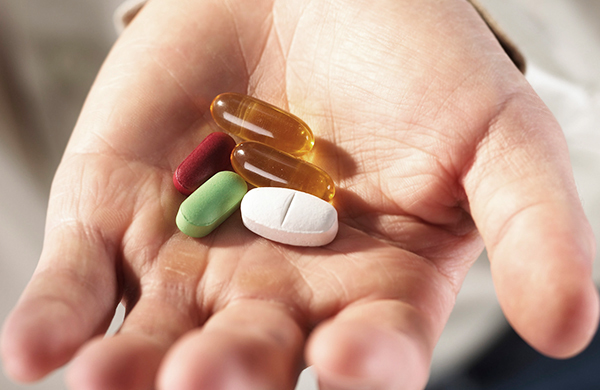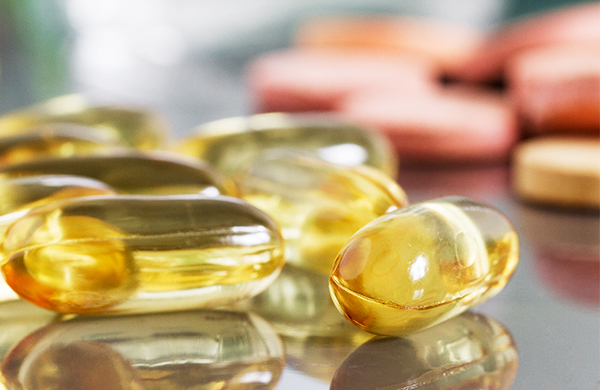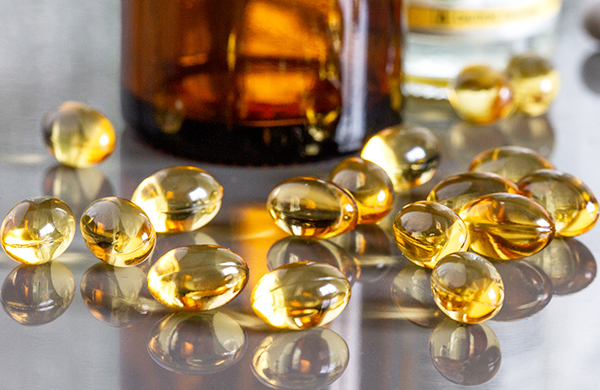
Deciding which vitamins and minerals to take to supplement a healthy diet can be tricky. Sure, you probably know that you need some calcium and vitamin C, and that's true—there are basic vitamins just about everyone should be getting in good supply.
But those basic vitamins won't cover every base; the most well-known vitamins aren't always the best vitamins for particular ailments, and you might need to stray from or add to the above staples. To help you better answer the question "What vitamins should I take?", we've provided a breakdown of 10 essential vitamins, and another 10 you might not have ever considered, but perhaps—depending on what you need from a vitamin—should.
10 Essential Vitamins and Minerals

What is it? Also known as folic acid (or synthesized folate), folate is simply a variety of vitamin B.
What's it good for? While not as well known as, say, vitamin C or calcium, folate is pretty important. In pregnant women, synthesized folate can prevent certain birth defects. For men, it can lower the risk of heart disease.
What is it? One of eight of the B vitamins, and also one of the largest and most complicated of all vitamins. It's water-soluble, meaning it dissolves in water and absorbs into the bloodstream.
What's it good for? Vitamin B12 is essential for healthy brain function; it can help prevent memory loss and boost both mood and the immune system.
3. Vitamin A
What is it? A fat-soluble vitamin that comes as either retinoids, which are found in animal products, or beta carotene, which is found in plants such as carrots, eggs, and apricots.
What's it good for? Vitamin A is hugely important for several basic functions and systems, chief among them strong eyesight, fortified immune systems, and cell growth.
What is it? Vitamin D is most well known as the vitamin you get from being exposed to sunlight.
What's it good for? The main function of vitamin D is too help the body absorb calcium, but it's also been known to reduce the risk of heart disease and diabetes, and it contributes to the overall function of the heart, lungs, and brain.
What is it? Technically, it's a mineral—it's one of the most common elements by mass in the crust of our planet—but you probably know it as the good stuff hiding in milk and dairy products.
What's it good for? Calcium fortifies the bones and helps repair them if they're damaged. There's also evidence that i can help prevent high blood pressure.
6. Vitamin E
What is it? For anyone with an average North American diet, vitamin E is usually manifest as a compound called γ-tocopherol, which is found in things like dressings, fortified cereals, and leafy greens.
What's it good for? Vitamin E helps build up the immune system, and it also maintains healthy eyes and skin.
What is it? Arguably the most well-known vitamin, vitamin C is also known as ascorbic acid. It's famously found in citrus fruits, as well as greens like broccoli and kale.
What's it good for? Vitamin C is renowned for being one of the best vitamins out there for your immune system; it helps fortify the system and protects against seasonal colds.
What is it? Fiber is a nutrient commonly found in plants like berries and beans. It's technically a type of carbohydrate.
What's it good for? While it's known as a digestion aid that can make you more "regular," fiber is also known to lower LDL cholesterol (AKA "bad" cholesterol) and increase HDL (the "good" kind).
What is it? Magnesium is a mineral that helps oversee the nervous system. High-magnesium foods include avocados, leafy greens, and even certain chocolates.
What's it good for? Due to its role in the function of the nervous system, magnesium can help prevent anxiety.
What is it? This one's pretty self-explanatory: it's the oil taken from fatty tissues in fish.
What's it good for? While fish oil can be used as a supplement to alleviate joint pain, it's also been known to help reduce heart disease.
10 Under-the-Radar Vitamins and Minerals

What is it? Scientifically classified as epimedium, horny goat weed is an herb made from a leafed plant native to China.
What's it good for? Horny goat weed may help boost circulation in men and reduce symptoms of erectile-dysfunction disorder.
What is it? Another Chinese-native plant, ginkgo biloba is a type of tall, leafy tree. In supplement form, it comes as an extract of the tree's leaves.
What's it good for? Ginkgo biloba has been studied for its potential benefits to memory, cognitive speed, and overall brain function.
What is it? Also known as melaleuca oil, tea-tree oil is an extract of leaves of melaleuca alternifolia, a shrub native to Australia.
What's it good for? The oil's natural antibacterial properties can help fight acne breakouts.
What is it? Another name for vitamin B7, biotin is typically found in foods that are also high in protein, like meats and dairy items.
What's it good for? Biotin is one of the best vitamins for hair and nails; it keeps the former lustrous and it prevents the latter from becoming brittle. It's also known as a key player in processing carbohydrates, and it's important in the healthy growth of fetuses.
What is it? You guessed it—this is an extract that comes from coffee beans that are still green (or not yet roasted).
What's it good for? Research has shown promising results that mark green-coffee-bean extract as an accelerator of metabolic and weight-loss processes, making it a great supplement for athletes looking to shed weight.
What is it? A natural cartilage, glucosamine is found in high amounts in the shells of crustaceans.
What's it good for? The most common use for glucosamine is as a sort of lubricant for achy joints. It's frequently taken by athletes to help them cope with conditions like runner's knee.
What is it? Melatonin is a hormone that's made naturally by a gland in your brain. It's also sometimes found in food, but that's not as common.
What's it good for? The hormone regulates your circadian rhythms, or your body's internal clock. Taking melatonin when traveling can help offset the wooziness and grogginess that come with jet lag.
What is it? If this one sounds familiar, it's probably because you've seen it in your spice cabinet before. Turmeric is an Indian spice made from the curcuma longa plant's roots.
What's it good for? The curcumin part is where this spice gets its medicinal value; the curcuminoid compound is loaded with antioxidants that fight inflammation. Turmeric's also been known to reduce cholesterol.
What is it? Also known as the horseradish tree or drumstick tree, moringa oleifera is a tree whose parts are used both as ingredients in food and as parts of herbal medicine.
What's it good for? Since it's so rich in nutrients, moringa oleifera is a bit of a jack of all trades: it can help reduce levels of blood sugar, cut down on inflammation, and lower cholesterol.
What is it? Milk thistle is a plant whose bright flowers are typically red, pink, or purple. It's a close relative of ragweed and daisies.
What's it good for? The main benefit of milk thistle is its role in the function of a healthy liver; it does so by raising the levels of glutathione, an antioxidant that helps the organ detox.






